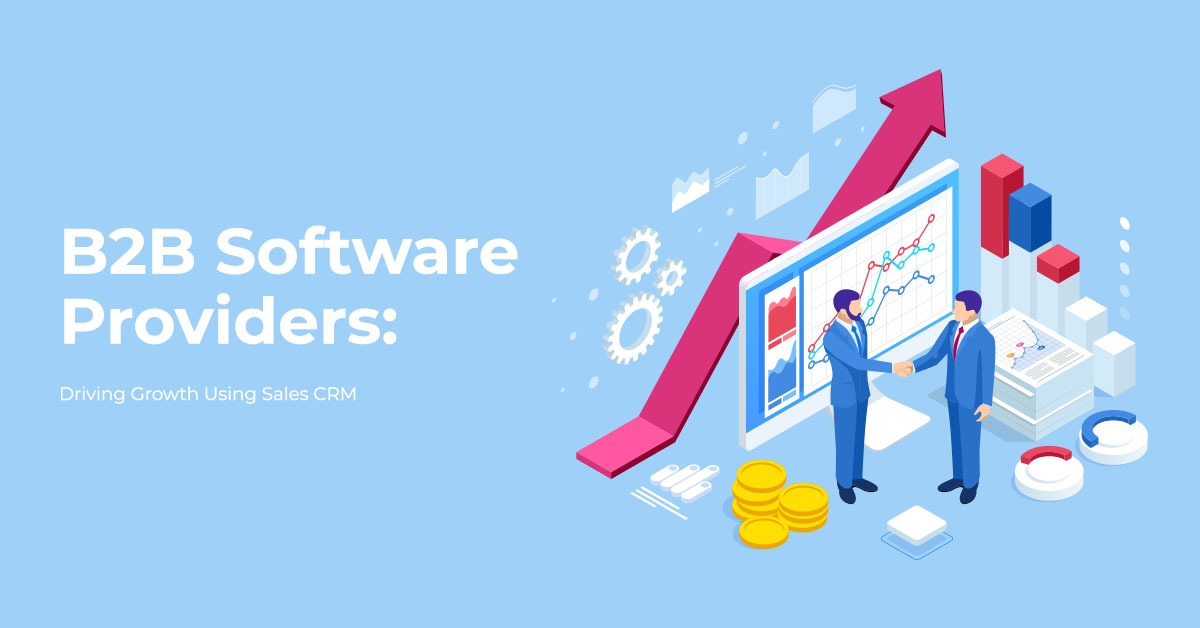B2B Software Providers: Driving Growth Using Sales CRM

Every business is faced with a challenge. It may come in the form of getting more customers to increase their sales, managing client information, keeping track of deals, monitoring sales performances, team communication, and collaboration, etc.
For Business-to-Business (B2B) software providers, these are business opportunities. With every sales need, B2B software providers create and develop solutions in the form of software (apps, extensions, add-ons) to fix business problems, help them achieve efficiency, and prevent unnecessary costs.
But B2B software providers themselves are not immune from getting these types of challenges. And instead of creating their own solutions, which can be costly to develop and maintain on their own, getting a third-party solution provider may be a more strategic alternative.
What is B2B Sales CRM?
B2B Customer Relationship Management refers to the type of software that incorporates principles and strategies that help B2B companies manage business relationships with existing and potential customers. It seeks to enhance companies’ approach to establishing long-term profitable relationships with leads and clients.
A B2B sales CRM is a software that is designed and developed for sales. It has all the features necessary for companies to efficiently run their sales processes— right from acquiring leads down to running campaigns to get existing customers to buy again (repeat purchases) — and drive growth in the end.
You may be interested in: What is an online CRM?
What is the best CRM for Sales?
What is “best” can vary from user to user. That’s why it’s important to first identify your needs and check whether the solution a provider is offering would fit those needs.
But below is a list of all-in-one CRMs that are best for sales:
Saphyte
Zoho CRM
Salesforce Sales Cloud
Bitrix24
Pipedrive
Ontraport
Nimble
Nutshell
Advantages of Sales CRM for B2B Companies
Manage potential and existing customers
Is your lead and client documentation disorganized? Do you find it hard to keep track of which client needs what? CRMs are exactly designed to help you record your interactions with certain clients, make notes of each client needs, and attach documents necessary for each client. So that each time a sales rep interacts with a client, the sales representative won’t have to scramble looking for previous records to know where they last left off.
What’s more is that users can also create and manage these records wherever they are, giving companies more mobility over their transactions with potential and existing clients.
Capture potential customers for more sales
Customers keep the business running. That’s why businesses need to ensure that more and more people discover the business and buy from it. The process of acquiring or capturing potential customers is called lead generation.
But acquiring leads can be tiring, time-consuming, and expensive. That’s why businesses should find ways to make this process more efficient. For example, if a business has a website or an online channel where they engage potential customers, they should make use of their landing pages to capture information from interested visitors.
This can be done through Landing Page Builders in CRMs. These landing pages can prompt website visitors to fill out a form. The details in the form can be used by the business to engage with these prospects and encourage them to make their first purchase.
Improve customer experience
When businesses are able to keep records of customers and pull them out anytime efficiently, it helps them serve their customers better by providing personalized interaction.
Personalized interactions mean that customers’ needs and preferences are taken into account every time a sales rep engages with them. This reduces “redundant behaviors” such as asking their customers for information again, asking again about what they need and want, or asking them to send documents again.
Having a systematic organization about their customers through the CRM also helps businesses communicate with them better by sending only relevant information. For example, when businesses send emails for promotion (or to encourage recipients to buy their products and services), CRMs’ database informs businesses which email to send to whom. In the end, customers will only get promotional messages that are targetive, and are relevant to their needs and preferences.
Increasing sales through emails
Emails are one of the most used forms of marketing. They can give you ROIs as high as 4000%. What’s more, is that this can be fully automated using CRMs, so your sales reps won’t have to craft an email for each client.